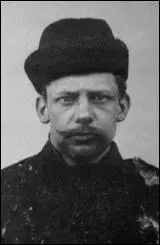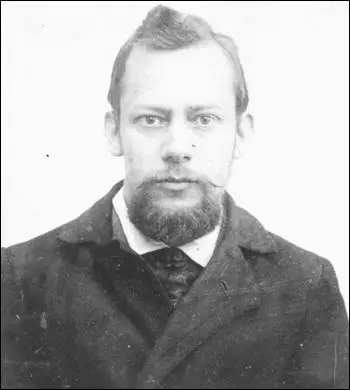Ivan Kalyayev

Ivan Kalyayev, the son of a Russian police inspector and Polish mother was born in Warsaw on 6th July, 1877. When he was twenty-years-old he entered Saint Petersburg University. He was sent into exile after becoming involved in political protests. In 1901 he joined the Social Democratic Labour Party (SDLP). Members included Julius Martov, Lenin, Leon Trotsky, Gregory Zinoviev, Joseph Stalin and Alexei Rykov. The SDLP was banned in Russia so most of its leaders were forced to live in exile. Its programme included the overthrow of the tsarist autocracy and the establishment of a democratic republic. (1)
The SDLP were followers of Karl Marx and did not think they should take action until they had persuaded the majority of the working-class of the need for a revolution. They were also totally opposed to acts of terrorism in order to achieve political change. Kalyayev dismissed their methods as being too moderate and left the party.
Ivan Kalyayev continued his education at Lemberg University where he developed an interest in poetry and revolution. During this period he joined the Party of Socialist Revolutionaries (SR). Led by Victor Chernov, the SR rejected the Marxist idea that the peasants were a reactionary class. Its main policy was the confiscation of all land. This would then be distributed among the peasants according to need. The party was also in favour of the establishment of a democratically elected constituent assembly and a maximum 8-hour day for factory workers. "The Socialist Revolutionaries refused, in fact, to recognize any fundamental distinction between workers and peasants: they organized themselves, and with some success, to work among both." (2)
Ivan Kalyayev and Terrorism
The SR, was influenced by the tactics used by the People's Will and had a terrorist wing, the SR Combat Organization. Membership of this group was secret and independent of the rest of the party. Gregory Gershuni, became its head and was responsible for planning the assassination of the Minister of the Interior, Dmitry Sipyagin, in April 1902 and of N. M. Bogdanovich, the Governor of Ufa, in May 1903. Gershuni was unaware that his deputy, Evno Azef, was in the pay of the Okhrana. In 1904 Azef secretly provided the secret police with the information needed to arrest and try Gershuni with terrorism. (3)
The next target was Vyacheslav Plehve, the Minister of the Interior. In a speech after taking office, Plehve argued: "Western Russia some 90 per cent of the revolutionaries are Jews, and in Russia generally - some 40 per cent. I shall not conceal from you that the revolutionary movement in Russia worries us but you should know that if you do not deter your youth from the revolutionary movement, we shall make your position untenable to such an extent that you will have to leave Russia, to the very last man!" (4) Lionel Kochan pointed out that "Plehve was the very embodiment of the government's policy of repression, contempt for public opinion, anti-semitism and bureaucratic tyranny". (5)
Plehve also secretly organized Jewish Pogroms. Plehve was hated by all radicals in Russia. Leon Trotsky commented: "Plehve was as powerless against sedition as his successor, but he was a terrible scourge against the kingdom of liberal newspapermen and rural conspirators. He loathed the idea of revolution with the fierce loathing of a police detective grown old in his profession, threatened by a bomb from around every street corner; he pursued sedition with bloodshot eyes - but in vain. Plehve was terrifying and loathsome as far as the liberals were concerned, but against sedition he was no better and no worse than any of the others. Of necessity, the movement of the masses ignored the limits of what was allowed and what was forbidden: that being so, what did it matter if those limits were a little narrower or a little wider?" (6)
Evno Azef, the new head of the Terrorist Brigade of the Socialist Revolutionary Party, ordered Plehve's assassination. Ivan Kalyayev and Egor Sazonov were chosen to carry out the killing. However, it was the bomb thrown by Egor Sazonov on 28th July, 1904, that killed Plehve. Emile J. Dillon, who was working for the Daily Telegraph, witnessed the assassination: "Two men on bicycles glided past, followed by a closed carriage, which I recognized as that of the all-powerful minister (Vyacheslav Plehve). Suddenly the ground before me quivered, a tremendous sound as of thunder deafened me, the windows of the houses on both sides of the broad streets rattled, and the glass of the panes was hurled on to the stone pavements. A dead horse, a pool of blood, fragments of a carriage, and a hole in the ground were parts of my rapid impressions. My driver was on his knees devoutly praying and saying that the end of the world had come.... Plehve's end was received with semi-public rejoicings. I met nobody who regretted his assassination or condemned the authors." (7)

Praskovia Ivanovskaia who took part in the conspiracy later pointed out: "The conclusion of this affair gave me some satisfaction - finally the man who had taken so many victims had been brought to his inevitable end, so universally desired." Dillon claimed that "I met nobody who regretted his assassination or condemned the authors". It was now decided to increase the number of assassinations. (8)
Assassination of Grand Duke Alexandrovich
The SR Combat Organization decided the next man to be assassinated was the Grand Duke Sergei Alexandrovich. the General-Governor of Moscow and uncle of Tsar Nicholas II. The assassination was planned for 15th February, 1905, when he planned to visit the Bolshoi Theatre. Kalyayev was supposed to attack the carriage as it approached the theater. Kalyayev was about to throw his bomb at the carriage of the Grand Duke, but he noticed that his wife and two young children were in the carriage and he aborted the assassination. (9)
Ivan Kalyayev carried out the assassination two days later: "I hurled my bomb from a distance of four paces, not more, striking as I dashed forward quite close to my object. I was caught up by the storm of the explosion and saw how the carriage was torn to fragments. When the cloud had lifted I found myself standing before the remains of the back wheels.... Then, about five feet away, near the gate, I saw bits of the Grand Duke's clothing and his nude body.... Blood was streaming from my face, and I realized there would be no escape for me.:.. I was overtaken by the police agents in a sleigh and someone's hands were upon me. 'Don't hang on to me. I won't run away. I have done my work' (I realized now that I was deafened)." (10)
While he was in prison he was visited by the Grand Duke's wife. She asked him "Why did you kill my husband?". He replied "I killed Sergei Alexandrovich because he was a weapon of tyranny. I was taking revenge for the people." The Grand Duchess offered Kalyayev a deal. "Repent... and I will beg the Sovereign to give you your life. I will ask him for you. I myself have already forgiven you." He refused with the words: "'No! I do not repent. I must die for my deed and I will... My death will be more useful to my cause than Sergei Alexandrovich's death." (11)
During his trial Kalyayev defended his actions: "First of all, permit me to make a correction of fact: I am not a defendant here, I am your prisoner. We are two warring camps. You - the representatives of the Imperial Government, the hired servants of capital and oppression. I - one of the avengers of the people, a socialist and revolutionist. Mountains of corpses divide us, hundreds of thousands of broken human lives and a whole sea of blood and tears covering the country in torrents of horror and resentment. You have declared war on the people. We have accepted your challenge." (12)
Ivan Kalyayev was sentenced to death. "I am pleased with your sentence," he told the judges. "I hope that you will carry it out just as openly and publicly as I carried out the sentence of the Socialist Revolutionary Party. Learn to look the advancing revolution right in the face." He was hanged on 23rd May, 1905. (13)
Primary Sources
(1) Ivan Kalyayev, letter to Boris Savinkov (February, 1905)
I hurled my bomb from a distance of four paces, not more, striking as I dashed forward quite close to my object. I was caught up by the storm of the explosion and saw how the carriage was torn to fragments. When the cloud had lifted I found myself standing before the remains of the back wheels.... Then, about five feet away, near the gate, I saw bits of the Grand Duke's clothing and his nude body.... Blood was streaming from my face, and I realized there would be no escape for me.:.. I was overtaken by the police agents in a sleigh and someone's hands were upon me. "Don't hang on to me. I won't run away. I have done my work" (I realized now that I was deafened). We drove in a cab through the Kremlin, as I shouted: "Down with the accursed Tsar, long live liberty! Down with the accursed Government, long live the Party of Socialist Revolutionists!"
(2) Edvard Radzinsky, The Last Tsar: The Life and Death of Nicholas II (1993)
Grand Duchess Elizabeth Fyodorovna... spent all the days before the burial in ceaseless prayer. On her husband's tombstone she wrote: 'Father, release them, they know not what they do.' She understood the words of the Gospels heart and soul, and on the eve of the funeral she demanded to be taken to the prison where Kalyayev was being held. Brought into his cell, she asked, 'Why did you kill my husband?' 'I killed Sergei Alexandrovich because he was a weapon of tyranny. I was taking revenge for the people.' 'Do not listen to your pride. Repent... and I will beg the Sovereign to give you your life. I will ask him for you. I myself have already forgiven you.' On the eve of revolution, she had already found a way out; forgiveness! Forgive through the impossible pain and blood -- and thereby stop it then, at the beginning, this bloody wheel. By her example, poor Ella appealed to society, calling upon the people to live in Christian faith. 'No!" replied Kalyayev. 'I do not repent. I must die for my deed and I will... My death will be more useful to my cause than Sergei Alexandrovich's death.' Kalyayev was sentenced to death. 'I am pleased with your sentence,' he told the judges. 'I hope that you will carry it out just as openly and publicly as I carried out the sentence of the Socialist Revolutionary Party. Learn to look the advancing revolution right in the face.'"
(3) Ivan Kalyayev, speech at his trial (May, 1905)
First of all, permit me to make a correction of fact: I am not a defendant here, I am your prisoner. We are two warring camps. You - the representatives of the Imperial Government, the hired servants of capital and oppression. I - one of the avengers of the people, a socialist and revolutionist. Mountains of corpses divide us, hundreds of thousands of broken human lives and a whole sea of blood and tears covering the country in torrents of horror and resentment. You have declared war on the people. We have accepted your challenge.... You dare not only to try me, but to pass judgement. What gives you the right to do so?.... You are quite ready to admit that there are two standards of morality: one for plain mortals, which says "do not kill," "do not steal," and another for political rulers, to whom everything is permitted. And you are really convinced that you are above the law and that there can be no judgement upon you.
